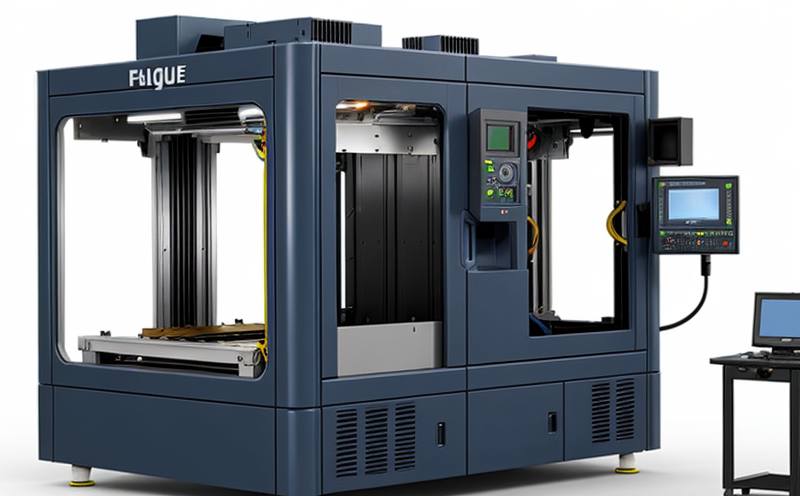ASTM D7791 Cyclic Fatigue Testing of Plastics
The ASTM D7791 cyclic fatigue testing method is a critical procedure used to evaluate the durability and reliability of plastic components under repetitive loading conditions. This test simulates real-world stresses that components face during their lifecycle, thereby ensuring they can withstand anticipated mechanical loads without failure.
ASTM D7791 is particularly relevant in industries such as aerospace, automotive, and medical devices where high-quality materials must maintain integrity over extended periods. By applying cyclic loading to specimens made from thermoplastic polymers, the test assesses how these materials behave under stress cycles that mimic actual operational conditions.
The ASTM D7791 test is conducted using specialized testing machines equipped with fixtures designed specifically for this type of specimen geometry. Specimens are typically prepared by injection molding or extrusion processes and must meet precise dimensional tolerances as specified in the standard. The cyclic loading is applied at a controlled rate, allowing engineers to observe both strength characteristics and any potential crack propagation mechanisms.
This testing method provides valuable insights into material fatigue life predictions which can inform design decisions aimed at extending component lifespan while maintaining performance standards. Additionally, results from ASTM D7791 help manufacturers ensure compliance with relevant industry regulations and customer specifications.
Understanding the limitations of this test is equally important; cyclic loading does not always replicate all aspects of real-world stress environments. Therefore, it should be used alongside other complementary testing methods to provide a comprehensive evaluation of plastic components.
Scope and Methodology
| Aspect | Description |
|---|---|
| Test Specimens | ASTM D7791 requires specimens to be prepared according to the dimensions specified in the standard. These typically include notched or un-notched samples with defined geometries. |
| Testing Parameters | The test involves applying cyclic loading at a specified frequency and force until failure occurs. The number of cycles to failure is recorded as an indication of material fatigue life. |
| Instrumentation | High precision testing machines capable of precise control over applied forces, frequencies, and displacement rates are essential for accurate ASTM D7791 testing. |
| Data Analysis | Data from the tests is analyzed to determine the fatigue life of each specimen. This data can then be used to predict potential failures in larger assemblies or entire systems. |
The ASTM D7791 test method is designed to provide a standardized approach for evaluating plastic components under cyclic loading conditions. By following these procedures, laboratories ensure that the results are comparable and reproducible across different facilities and testing environments.
Industry Applications
The ASTM D7791 cyclic fatigue test finds significant application in various sectors including aerospace, automotive manufacturing, medical device production, consumer goods, and more. In aerospace, for instance, this test ensures that critical components like fasteners or structural elements can endure the extreme conditions encountered during flight.
In automobiles, cyclic fatigue testing helps manufacturers identify weak points in components such as engine mounts or suspension parts before they are incorporated into vehicles. For medical devices, the ability to predict material behavior under repetitive loading is crucial for ensuring patient safety and device efficacy over extended periods of use.
Consumer goods companies also rely on ASTM D7791 testing to assess the durability of products like sporting equipment or household appliances that may experience substantial wear during normal usage.
The versatility of this test makes it an indispensable tool in quality assurance programs aimed at enhancing product reliability and extending service life across diverse industries.
Quality and Reliability Assurance
The ASTM D7791 cyclic fatigue testing method plays a pivotal role in ensuring that plastic components meet stringent quality and reliability standards. Through this rigorous evaluation process, manufacturers can identify potential weaknesses early in the development cycle, allowing for corrective actions to be implemented promptly.
By incorporating ASTM D7791 into their quality assurance processes, companies demonstrate their commitment to delivering high-performance products capable of withstanding harsh environmental conditions without compromising on safety or functionality. This approach not only enhances customer satisfaction but also contributes positively towards brand reputation and market competitiveness.
Furthermore, compliance with internationally recognized standards like ASTM D7791 adds credibility to the testing process, reinforcing trust between suppliers and customers alike. It serves as a benchmark against which performance can be measured consistently across different geographical locations and organizational structures.





